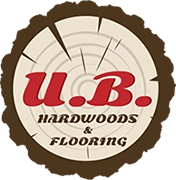Popular Types of Flooring
Whether you're looking for something lively and bold or elegant and subtle, there's a floor for you. Discover the most essential details about each type to guide your decision making.
Hardwood Flooring
Homebuyers across Minneapolis seek out hardwood flooring for its beauty and durability. It's available in several varieties to accommodate different designs, from maple and oak to cherry and walnut. However, it's among the priciest of flooring materials and requires significant upkeep. At a minimum, you'll need to use specialty cleaning products regularly and refinish the floor every few years. Since it's susceptible to water damage, it's also not suitable for laundry rooms, basements, or bathrooms.
Engineered Wood Flooring
Engineered wood gives you the beauty of hardwood without the extra maintenance. They use a plywood substrate with a layer of real hardwood on top – ultimately cutting your costs. While it's more resistant to warping versus true hardwood, it sounds more hollow to walk on and can't be refinished more than once.
Laminate Flooring
Laminate is another more affordable flooring option, consisting of a particleboard base, wood or tile finish, and protective plastic coating. It's scratch-resistant, easy to clean, and available in countless different colors and styles. However, it chips easily and is susceptible to moisture damage.
Vinyl Flooring
Vinyl flooring has excellent water and fading resistance and requires minimal upkeep. Popular options include luxury vinyl tile (LVT) and luxury vinyl plank (LVP), with both having equal durability and longevity depending on the model you buy. Their price point sits comfortably between wood and laminate.
Tile Flooring
Tile flooring is another classy design that can endure for years. Like vinyl, it requires minimal maintenance and is easy to clean. As such, it's an excellent choice for moisture-prone spaces like bathrooms and kitchens. However, it requires intensive prep work before installation and can be cool and sleek to walk on. Pricing relies on the material you select, with porcelain being more expensive than ceramic.
Stone Flooring
Granite, sandstone, marble, and travertine aren't just for the outdoors. Inside, they can give you a bold look and unparalleled water resistance. Despite its unique flair, it's not easy to clean, and long-term maintenance could be a bit more expensive.
Linoleum Flooring
Linoleum is made from linseed oil and cork and can last for decades if maintained properly. It’s a cost-effective option with many design possibilities. However, the softer material is easier to dent or scratch, and it's known to discolor with sun exposure. It’s also not suitable for areas with excess moisture like kitchens and bathrooms.
Carpet
Carpet is the most affordable flooring option. It can make a space feel more comfortable and is great for absorbing sound. You don’t have to worry about scratches or dents, and the cushioning makes it a safer choice for kids. However, the fibrous material easily retains stains, moisture, and odors, which isn't ideal for pet owners or allergy sufferers.
How to Choose a Minneapolis Flooring Company
Choosing the appropriate installer makes all the difference for your new floor's longevity. We recommend assessing different companies using the following criteria.
Reputation and Reviews
The most crucial thing to research about any flooring company is its reputation. Check review sites like Google, Trustpilot, Yelp, and the Better Business Bureau (BBB) to see what previous clients have to say. Even the most reliable flooring installers will have both positive and negative reviews. Look for how a provider responds to complaints and interacts with others. If it strives for a satisfactory resolution and acts in good faith, that's an encouraging sign. However, if it's combative or has a high negative-to-positive review ratio, it's best to avoid working with it.
Portfolio and References
Most floor installers keep portfolios of their previous work. We recommend requesting a copy so you can examine the crew's craftsmanship. Portfolios might also include references from past customers. Don't hesitate to request their contact information so you can discuss their interactions and thoughts about the company.
Specialization and Services
No two companies have the same experience or product offerings. You should find one that specializes in the material or type of floor you're interested in. Equally important is a company's service offerings. At the very least, it should offer cleanup and haul-away for your old flooring materials. However, if you're feeling lost in all the style, material, and color choices, you can also look for contractors with design teams.
Cost
Cost is crucial to consider, but it should be less important than quality in your decision-making process. We recommend getting at least three different quotes for your flooring job to compare pricing and workmanship. Many companies offer on-site and online estimates to ease the process.
Warranties and Guarantees
You should look for two different warranties in your company search. A manufacturer's warranty protects you in case of a product defect, while an installer's warranty covers workmanship. Depending on the installer and flooring brand you select, warranty protection could be limited to a fixed term. Other times, it continues for the life of the floor. Ask a company about its warranty terms, including extensions that could give you additional coverage.
Estimated Timeline
You don't want your flooring work to last longer than expected. Get an estimated timeline up-front and ask about potential delays. Express your expectations clearly and secure any guarantees in writing.
Ready to Get a Quote on Your Flooring Project?
Please enter a valid 5-digit zip code!
Frequently Asked Questions About Flooring in Minneapolis
What are the best flooring installation prices?
See our guides to how much each flooring type typically costs:
What are some of the most popular types of flooring in Minneapolis?
Do Minneapolis flooring companies need to be licensed?
What is the best type of flooring for a kitchen?
What are the signs it's time to replace my old flooring?
- Widening gaps between planks/tiles
- Severe mold or mildew growth
- Deep holes, dents, or scratches
- Patches that feel unstable
- Excessive squeakiness
- Water damage
To share feedback or ask a question about this article, send a note to our Reviews Team at reviewsteam@thisoldhousereviews.com.

















